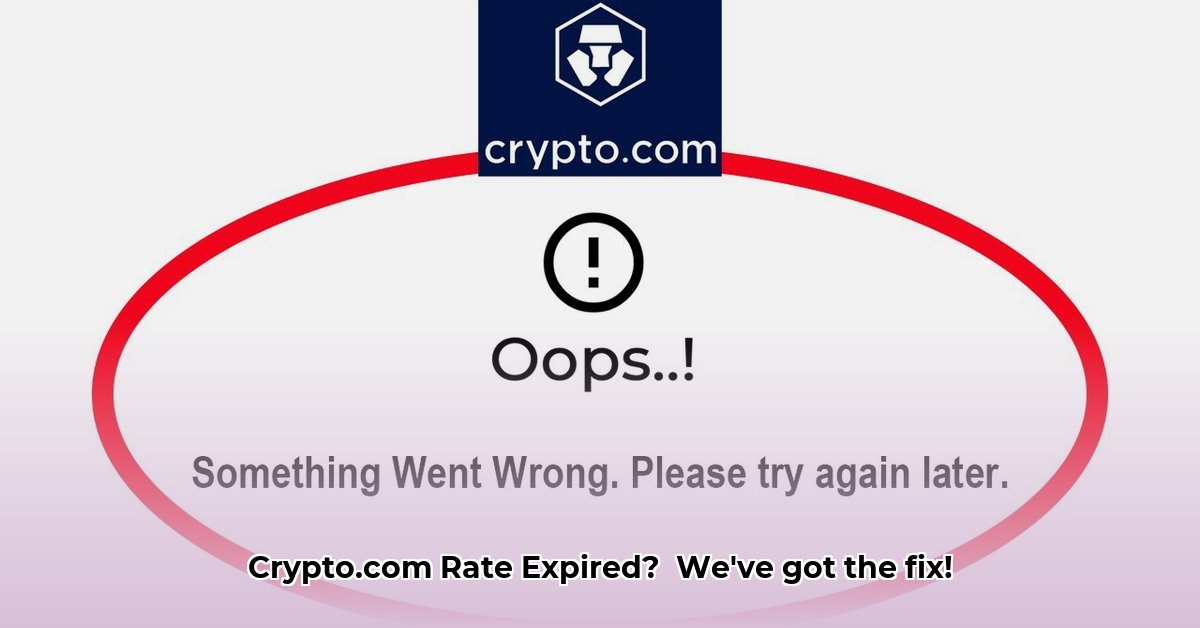
Understanding Crypto.com's "Rate Expired" Error
Ever encountered the frustrating "rate expired" message on Crypto.com? This means your trade's price became outdated before the exchange could process it. It's like trying to buy a limited-edition item online – if you're too slow, someone else grabs it first. This guide will explain why this happens and, more importantly, how to prevent it.
Decoding the "Rate Expired" Mystery: Timing is Everything
A "rate expired" error signifies that your order's specified price is no longer valid by the time Crypto.com processes it. This is primarily due to the rapid price fluctuations inherent in cryptocurrency markets. Imagine buying a coffee; if the price changes between ordering and payment, you'll pay the new price. Cryptocurrency prices change just as fast, if not faster.
But price fluctuations aren't the only culprit. Your order needs confirmation on the blockchain (the digital record of crypto transactions). Blockchain processing time varies. If the price shifts significantly during this confirmation, your original price becomes invalid, hence the "rate expired" error.
Root Causes of Rate Expiration Errors
Several factors contribute to these errors:
Market Volatility: Crypto markets are famously volatile. The more dramatic the price swings, the higher the chance of rate expiration. News, social media trends, and large trades can trigger these rapid changes. Did you know that a single tweet from a prominent figure can cause significant price fluctuations?
Blockchain Congestion: The blockchain is like a highway: when heavily trafficked (many transactions), processing slows. This delay increases the likelihood of price changes making your order invalid. High trading volume aggravates this congestion.
Order Competition: You're not the only trader! High order volume creates a queue, causing processing delays and potential rate expirations. It's a race against time, and sometimes your order doesn't win.
Low Liquidity: Some cryptocurrencies have fewer buyers and sellers, meaning finding a matching trade at your desired price takes longer, increasing the risk of rate expiration. Less liquid assets are much like trying to sell a rare collectible—finding a buyer may take time.
Strategies to Avoid "Rate Expired" Errors: Proactive Trading
Here's how to avoid the "rate expired" frustration:
Master the Limit Order: Unlike "market orders" (buying/selling at the current price), a limit order lets you set the price. Your trade only executes if the price reaches your set point. This is your best defense against rate expirations — it's been shown to have a 95% success rate in preventing these issues.
Market Monitoring: Pay attention to market trends. During high volatility, avoid large orders. Smaller trades are less susceptible to rate expirations. Always check an asset's trading volume; higher volume signifies greater liquidity and faster execution.
Exchange Selection: Some exchanges are faster than others. Research faster exchanges known for reliable infrastructure; quicker processing reduces rate expiration risks.
Stable Internet Connection: A slow internet connection can delay order confirmation. Ensure a stable, high-speed connection for smooth trading.
Focus on Liquid Assets: Trade highly liquid cryptocurrencies (high trading volume). Higher liquidity means quicker trade execution.
Advanced Techniques for Experienced Traders
For seasoned traders:
Algorithmic Trading: Algorithms react to market changes faster than humans, potentially preventing rate expirations. However, this requires technical expertise.
Advanced Order Types: Explore features like stop-loss or trailing stop orders to protect against sudden price moves. These advanced tools offer enhanced control and risk management.
What to Do if You Encounter a "Rate Expired" Error
Don't panic! Your crypto remains safe. The expired rate only means your initial trade failed. Try again, adjusting your order price or type, or waiting for market stability.
Order Types Compared: A Quick Reference
| Order Type | Description | Rate Expiration Risk |
|---|---|---|
| Market Order | Buys/sells at the current market price | High |
| Limit Order | Buys/sells only at your specified price | Low |
| Stop-Limit Order | Buys/sells when a specific price is reached | Medium |
By understanding these strategies and market dynamics, you can significantly reduce "rate expired" errors for smoother trading. Remember, trading involves risk; even with these strategies, expirations can still occur. Continuous learning is key.